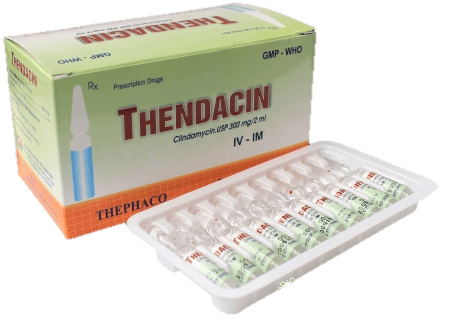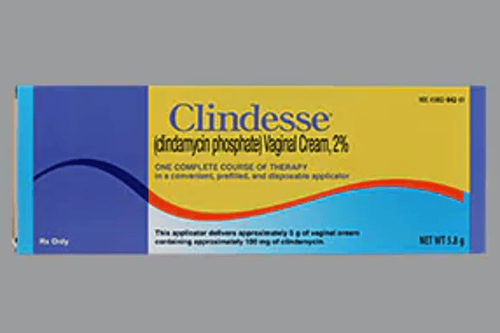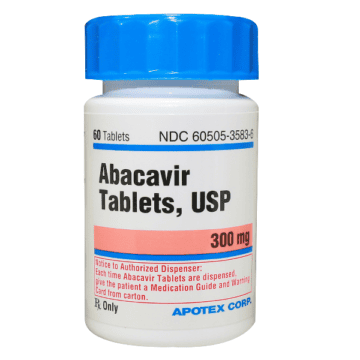This is an automatically translated article.
Fukanzol contains the ingredient Clindamycin (in the form of Clindamycin phosphate), prepared in the form of lyophilized powder for injection. The drug is indicated in the treatment of serious infections caused by bacteria sensitive to Clindamycin such as pneumonia, pleurisy, lung abscess, skin and subcutaneous tissue infections, gynecological infections, sepsis...
1. What effect does fukanzol have?
Fukanzol contains the ingredient Clindamycin (in the form of Clindamycin phosphate), which is an antibiotic of the lincosamide group with the main effect being bacteriostatic when used at low concentrations and bactericidal slowly against susceptible strains of bacteria if used in high concentration. Fukanzol's mechanism of action is to bind to the 50S subunit of the ribosome, thereby inhibiting bacterial protein synthesis, preventing bacterial replication.
2. Indications to use Fukanzol
Fukanzol is used to treat serious infections caused by microorganisms sensitive to Clindamycin such as:
Lower respiratory tract infections including: Pneumonia, pleurisy and lung abscess. Infections of the skin and subcutaneous structures. Gynecological infections include: endometritis, pelvic cellulitis, nongonococcal uterine ovary abscess caused by susceptible anaerobic bacteria, vaginal ring infection. Intra-abdominal infections include: Abdominal abscess caused by susceptible anaerobic bacteria, peritonitis. Sepsis . Bone and joint infections, including acute osteomyelitis.
3. Contraindications of the drug Fukanzol
Fukanzol absolutely must not be used in the following cases: The patient has a history of allergy or hypersensitivity to Clindamycin, Lincomycin or any other ingredient of the drug. People with meningococcal disease. Also, do not take Fukanzol with Erythromycin
4. Dosage and how to use Fukanzol
4.1. How to use Fukanzol Fukanzol is prepared in the form of lyophilized powder for injection and infusion. Fukanzol is used as prescribed by a doctor, by injection, intravenous infusion or intramuscular injection. Therefore, patients are not allowed to arbitrarily mix and infuse drugs at home, but need to go to a medical facility for a detailed examination and to be ordered by the doctor to administer the drug. Fukanzol must be diluted before intravenous administration. The concentration of Fukanzol in the diluent for infusion should not exceed 18 mg/ml and the infusion rate should not exceed 30 mg/min. A 1-hour infusion of more than 1200 mg of fukanzol is not recommended. When diluting Fukanzol according to the instructions on the package insert, the drug should be kept stable for 16 days if stored at room temperature (25 degrees Celsius) or for 32 days if stored in the refrigerator 4 degrees. C, or for 8 weeks if stored frozen (-10 degrees C) 4.2. Dosage of Fukanzol The following recommended therapeutic doses for Fukanzol are for reference only. Therefore, before using Fukanzol, patients should have a doctor's prescription.
Severe infections: Dose 600-1200mg/day divided into 2, 3 or 4 times a day. More severe infections: 1200-2700mg/day divided into 2, 3 or 4 times a day. For more severe infections, higher doses may be required. In life-threatening cases due to aerobic or anaerobic bacteria, the dose may be increased. Doses can be up to 4800mg per day and administered intravenously. Specific treatment dose for some diseases:
Children
Newborns < 1 month old: Dosage 15-20mg/kg/day divided into 3 or 4 times a day, administered intramuscularly or intravenously. Children from 1 month to 16 years of age: Dosage 20-40mg/kg/day divided into 3 or 4 times a day, administered intramuscularly or intravenously In case of infection by beta-hemolytic streptococcus bacteria, Continue to treat the child for at least 10 days. Adults
Stomatitis: 150-450 mg/time, every 6 hours, lasts for 7 days, the maximum dose is up to 1.8 g/day. Prophylaxis of endocarditis: 600mg dose / time about 30-60 minutes before the patient has the procedure. Prophylaxis of sepsis in knee replacement patients undergoing dental surgery: 600mg/time, administered 1 hour before surgery. Toxoplasmosis: 600mg/time, administered every 6 hours, should be combined with Pyrimethamine and folinic acid. Maternal fever (genital tract infection): For pregnant women who have no clinical symptoms but have fever lasting more than 48 hours, a dose of 300mg should be used every 8 hours (if caused by Mycoplasma) until the patient is sick. fever gone. Patients with renal and hepatic impairment: The dose of Fukanzol should be reduced for patients with severe hepatic or renal impairment, it is not necessary to adjust the dose reduction if the patient has mild to moderate renal impairment.
5. Undesirable effects of the drug Fukanzol
When using the drug Fukanzol may cause some of the following side effects:
Digestive system: Abdominal pain, nausea, vomiting, pseudomembranous colitis. Systemic reactions: Erythema, maculopapular, urticaria, mild to moderate measles-like erythema, Stevens-Johnson syndrome, anaphylactic reaction. On skin and mucous membranes: Itching, vaginitis and, rarely, exfoliative dermatitis. On the liver: jaundice, increased liver enzymes. Blood and Lymphatic System: Eosinophilia, transient neutropenia, agranulocytosis and thrombocytopenia. Local reactions: Stiff pain at injection site, injection site abscess after intramuscular injection, phlebitis and thrombosis after intravenous injection. Musculoskeletal system: Polyarthritis, however rare. Cardiovascular system: There have been rare cases of cardiopulmonary arrest and hypotension following rapid intravenous administration of Fukanzol. Although the above is not a complete list of unwanted side effects of Fukanzol, but when the patient has any unusual signs during treatment, it is necessary to immediately notify the doctor or medical staff. have high expertise to be handled correctly.
6. Precautions when using Fukanzol
Patients using Fukanzol should pay attention to the following information:
Diarrhea caused by Clostridium difficile can occur when using nearly all antibiotics, including Fukanzol antibiotic, and symptoms may occur. range in severity from mild diarrhea to symptoms of colitis and death. Patients with pseudomembranous colitis, diarrhea need to report their medical condition to their doctor before using Fukanzol. Patients on long-term use of Fukanzol, when Clostridium difficile diarrhea is suspected or diagnosed, should be given fluids, appropriate electrolytes, protein supplements for the patient, C. difficile antibacterial therapy and evaluation. surgery according to the patient's clinical symptoms. In case of meningitis patients, although Fukanzol can diffuse into the cerebrospinal fluid, but the concentration of Fukanzol in the cerebrospinal fluid is not enough to treat meningitis. meningitis. Fukanzol should be used with caution in patients with a history of asthma or a history of allergy or hypersensitivity to multiple drugs. Because patients are at high risk of anaphylactic reactions when using the drug. Use of Fukanzol may lead to overgrowth of non-susceptible organisms, in particular yeast. Therefore, patients need to be monitored for clinical symptoms, laboratory tests to assess signs of opportunistic infection, bacterial superinfection to have appropriate treatment for the patient. In patients with moderate and severe hepatic impairment, Fukanzol should be used with caution and with periodic monitoring of liver enzymes when taking high doses of Fukanzol. Pregnancy: In vitro studies have shown that reproduction was performed in rats and mice at subcutaneous doses of Fukanzol up to 250 mg/kg/day (0.9 and 0 fold). ,5 times the recommended adult dose based on mg/m2, respectively) showed evidence of teratogenicity. However, there are no adequate and appropriate clinical studies of fukanzol in pregnant women. Animal reproduction studies are not predictive in humans, so Fukanzol should only be used under the direction of a physician if the potential benefit outweighs the risk of unwanted side effects. Lactation: Fukanzol has been reported to be excreted in human milk. Because of the potential for serious side effects in nursing infants, mothers should use caution when taking Fukanzol, recommending taking the drug as prescribed by a doctor to avoid unwanted side effects. Vehicles and operating machines: Fukanzol can be used by people driving and operating machines.
7. Fukanzol drug interactions
When using Fukanzol, patients should pay attention to the following drug interactions:
Fukanzol has a neuromuscular blocker effect, so it may increase the effect of other neuromuscular blocking drugs, so it is necessary to use Fukanzol should be used with caution when patients are taking these blocking agents. In addition, during use, patients should be closely monitored for clinical symptoms, because of the long-lasting neuromuscular blockade. Fukanzol should not be used concurrently with the following drugs:
Oral steroid contraceptives, as Fukanzol reduces the effectiveness of these contraceptives. Erythromycin, because these agents act at the same site on the bacterial ribosome, binding of one to the bacterial ribosome may inhibit the action of the other. Diphenoxylate, loperamide, or opiates (anti-motility agents), which may aggravate Fukanzol-induced pseudomembranous colitis, because they slow the elimination of toxins. Kaolin - pectin suspension, because it reduces the absorption of fukanzol. Oral typhoid vaccine because Fukanzol may reduce the effectiveness of the vaccine Anticholinesterase drugs because Fukanzol antagonizes the action of anticholinesterase drugs (neostigmine and pyridostigmine). Vitamin K Antagonists: Increases in coagulation tests (PT/INR) and/or bleeding in patients treated in combination with Fukanzol with a vitamin K antagonist (eg, Warfarin, acenocoumarol). Therefore, regular monitoring of coagulation tests is recommended in patients treated with vitamin K antagonists. Fukanzol contains clindamycin (as Clindamycin phosphate) and is available as a lyophilized powder for injection. . The drug is indicated in the treatment of serious infections caused by microorganisms sensitive to clindamycin such as lower respiratory tract infections including: pneumonia, pleurisy and lung abscess, skin and skin structure infections, secondary infections The patient needs to take the drug according to the instructions of the doctor or specialist pharmacist to ensure the effectiveness of the drug and avoid unwanted effects.
Follow Vinmec International General Hospital website to get more health, nutrition and beauty information to protect the health of yourself and your loved ones in your family.
Please dial HOTLINE for more information or register for an appointment HERE. Download MyVinmec app to make appointments faster and to manage your bookings easily.













